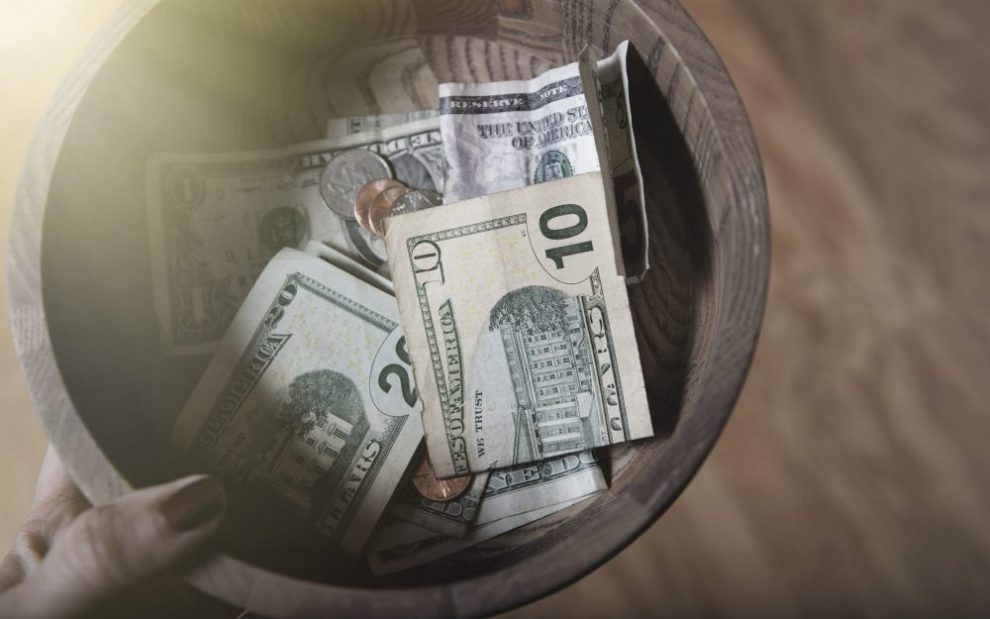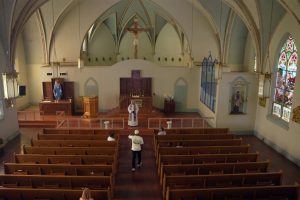My family has had the privilege of our fiscal health improving throughout the pandemic—bolstered retirement accounts thanks to a rallying stock market, stimulus checks, less money spent on traveling and entertaining—yet it came at the cost of shrinking joy in our household. As work from home stretched on, I let the boundaries between my professional and family responsibilities blur, with my job always winning out under the rationalization that financial security was the greatest good. Instead of looking forward to when our city would reopen and spontaneous interactions with friends on the sidewalk, impromptu weekday dinner parties, and our remarkably talented parish choir would return, I became laser-focused on trying to escape our modest two-bedroom apartment and to gain more space that would allow us to live insularly apart.
Despite hearing John’s gospel about the woman at the well each year—“You worship what you do not know” (John 4:22)—I had never really paid attention to that line before. Sitting in my regular pew during the year of “uncertain times,” I realized unequivocally that Jesus was also speaking this line to me. I had become fixated on questions with answers I could not predict: What if my family got sick? What if I lost my job? Is it still wise to raise my toddler in the city we’ve called home for a decade? I responded to my rising anxiety with increased caution, particularly in how we spent our money. Numbers felt controllable: We shifted our grocery shopping to a less expensive chain. We cancelled a summer trip to Vermont. We decreased our annual donations to our college alma mater. None of this quelled my anxious heart.
I had forgotten Mother Teresa’s warning to “never let anything so fill you with sorrow as to make you forget the joy of Christ risen.” The pandemic blinded me to what intrinsically brought me joy: a faith-filled and Christ-centered community. I’ve spent the majority of my professional career in fundraising and development for an Ivy League university. Despite knowing the talking points about the importance of philanthropy, I did not fully internalize them. And although my family gave to our parish and other charitable causes, we did not tithe.
To tithe or not to tithe
The word tithe comes from an Old English word meaning a “tenth part.” It refers to the biblical exhortation to return to God 10 percent of God’s gifts. In the Old Testament we read the words of the patriarch Jacob: “And this stone, which I have set up for a pillar, shall be God’s house; and of all that you give me I will surely give one-tenth to you” (Gen. 28:22). While there is no mention of tithing in the New Testament, the Catechism of the Catholic Church expresses: “The faithful . . . have the duty of providing for the material needs of the church, each according to his abilities.”
This seems to indicate that there is no strict obligation for Catholics to tithe. However, many dioceses recommend contributing 5 percent of take-home pay to parishes and an additional 5 percent to other charities. Looking at my budget spreadsheet—a document that guides so many of our family’s important decisions—I was keenly aware that we were doing neither. In fact, tithing (meaning the whole 10 percent) remains a fairly rare practice across many churches. Many Christians—and particularly Catholics—give far less.
I decided that, in a time of stockpiling resources, our family would take the pandemic as an opportunity to finally freely and (even) cheerfully tithe. While I could be undecided if we would remain in our little corner of West Philadelphia, I did know I wanted our church’s dome—and the community that gathers beneath it every Sunday—to continue to stand as a beacon of hope for all the Catholics who find their way here after us. That is something still largely out of my control, but every time my son drops our envelope in the basket, it feels like a small act of solidarity toward creating the future I hope to see.
In the Bible, Jesus never said to give 10 percent of your income, but he did command us to make disciples, care for the poor, love our neighbors as ourselves, and pray. All of this is tithing too and—at least for me—even more difficult than writing a check every Sunday. As a Millennial in a liberal pocket of a liberal city, I often feel apologetic about attending Mass. How do I, like the woman at the well, leave my water jar and go into town to say to the people, “He cannot be the Messiah, can he?” (John 4:29). That is yet another question I do not have a good answer for, but I hope to at least work toward solving it with joy.
In fact, tithing (meaning the whole 10 percent) remains a fairly rare practice across many churches. May Christians—and particularly Catholics—give far less.
Advertisement
A new definition
With pandemic restrictions lifted, there are once again opportunities to interact with those outside our “bubbles.” As I try to widen the bubble that protected me from COVID-19, I am also striving to pop the one that I constructed prepandemic, the one that shielded me from human suffering and challenging human interactions. Whether that looks like volunteering with the local Catholic Worker House or talking more openly and honestly about my relationship with Jesus, I am not sure. But I know that as I reenter society physically, I want to reintegrate into it spiritually as well.
In an interview with Religion News Service, Dan Cellucci, chief executive officer of Catholic Leadership Institute—a lay group that helps bishops and parish priests sustain their parishes—speaks to how the pandemic accelerated already declining Mass attendance, leading to a “great winnowing” among Catholic communities. He notes the Catholic Church’s tendency “to look down and stay huddled” and calls instead for us “to push ourselves and each other to lift our heads up.”
For me, that is creating a more sacrificial budget for our family—one less focused on experiencing our city by dining out, drinking artisanal coffee, and buying a house in a hip neighborhood and more focused on actually making where we live stronger through building up our church community and the people it serves. It means meditating on Matthew 6:25–27, reminding myself every day, “Can any of you by worrying add a single hour to your span of life?” It means pushing my comfort socially as well as fiscally.
Jesus never said to give 10 percent of your income, but he did command us to make disciples, care for the poor, love our neighbors as ourselves, and pray.
Advertisement
One of my first supervisors once told me, “We dig wells from which we will not drink.” We may not personally have the opportunity to see how the relationships we cultivate now through the sharing of ourselves will benefit the institution, but we should trust that every warm, positive interaction we facilitate will ultimately lead to good. In all likelihood, I will never see if my small financial contributions or clumsy attempts at evangelization will ensure the longevity of my parish or promulgate a conversion of hearts. I hope somehow they might. But like the Samaritan of John’s gospel, refocusing the efforts I make in this small way might be enough to lead me (and perhaps others) to say: “And we know that this is truly the Savior of the world” (John 4:42). In a world of unknowns, that is enough.
This article also appears in the September 2021 issue of U.S. Catholic (Vol. 86, No. 9, pages 19-20). Click here to subscribe to the magazine.
Image: Shutterstock/Lamppost Collective














Add comment